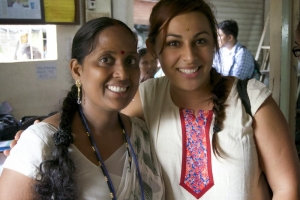Students Share Impactful Study Abroad Experiences
August 06, 2014- Opinion
This summer's global immersion trip to India included stops in Mumbai, Jawhar, Pune and rural Maharashtra, where Master of Social Work students and faculty observed daily life and participated in community development projects. They witnessed everything from the effects of abject poverty to the resilience of the country's people, including how a local social worker started a micro-finance nonprofit organization to empower women.
Students shared their experiences and observations by blogging about them. MSW student Angela Lara Lomeli wrote about how an experience so far away from home made her realize how connected we all actually are.
Domestic violence: a reality that many women shined a light on here in India, especially the women from the Labour Education And Research Network (LEARN). As they shared their painful experience, I could not help but cringe and swallow my own memories. Yet, I was so interested in how they have been able to defend themselves and fight against it. I could not help but to remember my own experience growing up in a household where the tactics of domestic violence controlled my family’s upbringings. I was deeply in awe. I must say that I truly respect the strength the women demonstrated while they shared their stories. I greatly admire how they have been able to come together to create an escape for the violence and at the same time empower themselves through employment to establish sustainable livelihoods. I am very proud of their dedication, hard work and passion to address the issue of domestic violence at a greater level.
Hearing their stories, particularly that of LEARN President Atmadevi Jaiswar, brought chills to my body as she described the pain she bore while her husband physically and emotionally battered her. On top of that, her husband, as well as her in-laws, forced her to wear a ghungat, a face veil, that kept her away from the clarity of the world around her and suppressed her from her self empowerment. Because of these experiences, her aspirations to live a different reality only intensified. She described a desire to show her face, connect with others and even a desire to be looked at. All she craved was being noticed and treated as the human she was. I could only imagine how difficult it must have been to be abused and to feel as if she were trapped in a cage. It was just as traumatic for her children to witness such abuse, as I recall how miserable it was for me to witness the abuse in my household.
There was no way I could leave that day without personally thanking Atmadevi for sharing her story and describing how she tore the veil apart once she was empowered. I had to notify her that she had instilled a sense of hope for a better tomorrow. So I did. I told her that I would share her story with my mother and the many women in my family who are also in domestic violence relationships. She suggested that I work with them to help strengthen the sense of empowerment within them. I told her that I personally felt empowered through a strength that I was craving to hear. I hugged her and told her I appreciated her. As she continued to hear me share my experience with her, she began to cry. Her tears demonstrated an accepted connection that words cannot even describe. It was a human connection that we both shared. I am forever thankful to her as she made me realize the power within myself as an agent of change.
To read more about how this trip to India affected MSW students, visit http://trojansgoneglobal.blogspot.com/.
To reference the work of our faculty online, we ask that you directly quote their work where possible and attribute it to "FACULTY NAME, a professor in the USC Suzanne Dworak-Peck School of Social Work” (LINK: https://dworakpeck.usc.edu)
